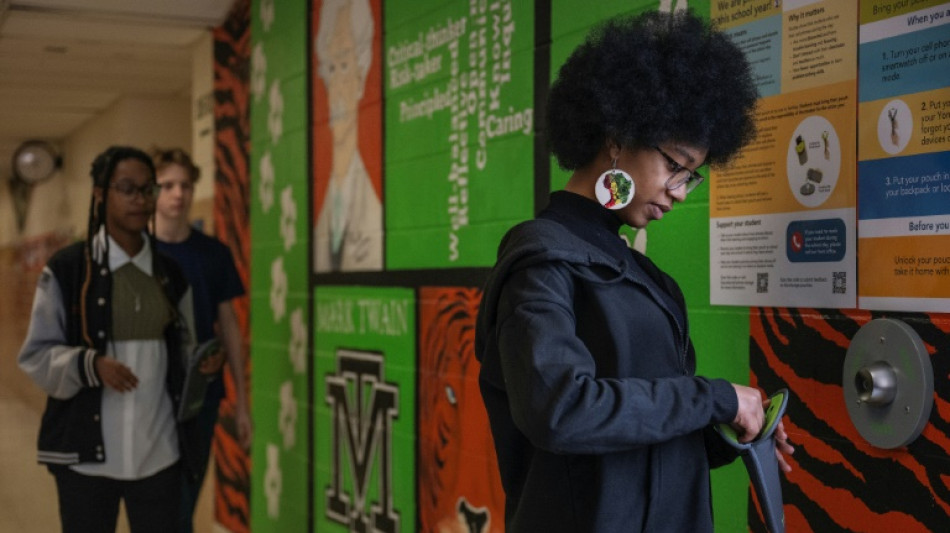
-
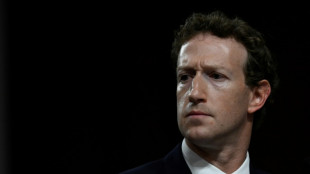 Zuckerberg denies Meta bought rivals to conquer them
Zuckerberg denies Meta bought rivals to conquer them
-
Starc stars as Delhi beat Rajasthan in Super Over

-
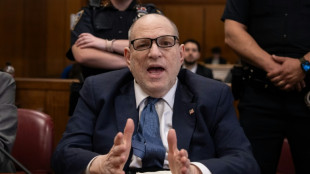 Weinstein asks to sleep in hospital, citing prison 'mistreatment'
Weinstein asks to sleep in hospital, citing prison 'mistreatment'
-
Amorim asks McIlroy to bring Masters magic to Man Utd

-
 Ruud keeps Barcelona Open defence on course
Ruud keeps Barcelona Open defence on course
-
Trump tariffs could put US Fed in a bind, Powell warns

-
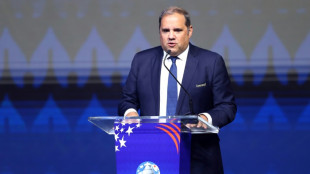 CONCACAF chief rejects 64-team World Cup plan for 2030
CONCACAF chief rejects 64-team World Cup plan for 2030
-
Putin praises Musk, compares him to Soviet space hero

-
 Son to miss Spurs' Europa League trip to Frankfurt
Son to miss Spurs' Europa League trip to Frankfurt
-
US senator in El Salvador seeking release of wrongly deported migrant

-
 Trump tariffs could put the US Fed in a bind, Powell warns
Trump tariffs could put the US Fed in a bind, Powell warns
-
US judge says 'probable cause' to hold Trump admin in contempt

-
 India opposition slams graft charges against Gandhis
India opposition slams graft charges against Gandhis
-
Nate Bargatze to host Emmys: organizers

-
 US Fed Chair warns of 'tension' between employment, inflation goals
US Fed Chair warns of 'tension' between employment, inflation goals
-
Trump touts trade talks, China calls out tariff 'blackmail'

-
 US judge says 'probable cause' to hold govt in contempt over deportations
US judge says 'probable cause' to hold govt in contempt over deportations
-
US eliminates unit countering foreign disinformation

-
 Germany sees 'worrying' record dry spell in early 2025
Germany sees 'worrying' record dry spell in early 2025
-
Israel says 30 percent of Gaza turned into buffer zone

-
 TikTok tests letting users add informative 'Footnotes'
TikTok tests letting users add informative 'Footnotes'
-
Global uncertainty will 'certainly' hit growth: World Bank president

-
 EU lists seven 'safe' countries of origin, tightening asylum rules
EU lists seven 'safe' countries of origin, tightening asylum rules
-
Chelsea fans must 'trust' the process despite blip, says Maresca

-
 Rebel rival government in Sudan 'not the answer': UK
Rebel rival government in Sudan 'not the answer': UK
-
Prague zoo breeds near-extinct Brazilian mergansers

-
 Macron to meet Rubio, Witkoff amid transatlantic tensions
Macron to meet Rubio, Witkoff amid transatlantic tensions
-
WTO chief says 'very concerned' as tariffs cut into global trade

-
 Sports bodies have 'no excuses' on trans rules after court ruling: campaigners
Sports bodies have 'no excuses' on trans rules after court ruling: campaigners
-
Zverev joins Shelton in Munich ATP quarters

-
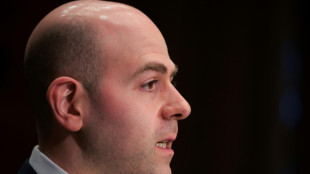 The Trump adviser who wants to rewrite the global financial system
The Trump adviser who wants to rewrite the global financial system
-
US senator travels to El Salvador over wrongly deported migrant

-
 UN watchdog chief says Iran 'not far' from nuclear bomb
UN watchdog chief says Iran 'not far' from nuclear bomb
-
Trump says 'joke' Harvard should be stripped of funds

-
 Macron vows punishment for French prison attackers
Macron vows punishment for French prison attackers
-
Canada central bank holds interest rate steady amid tariffs chaos

-
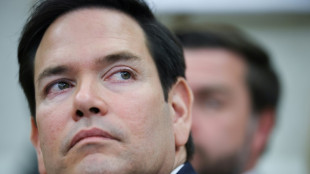 Rubio headed to Paris for Ukraine war talks
Rubio headed to Paris for Ukraine war talks
-
Australian PM vows not to bow to Trump on national interest

-
 New attacks target France prison guard cars, home
New attacks target France prison guard cars, home
-
Global trade uncertainty could have 'severe negative consequences': WTO chief

-
 Google facing £5 bn UK lawsuit over ad searches: firms
Google facing £5 bn UK lawsuit over ad searches: firms
-
Onana to return in goal for Man Utd against Lyon: Amorim
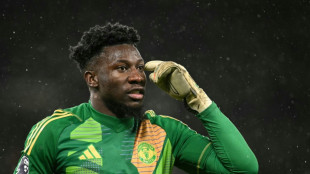
-
 Tiktok bans user behind Gisele Pelicot 'starter kit' meme
Tiktok bans user behind Gisele Pelicot 'starter kit' meme
-
'Put it on': Dutch drive for bike helmets

-
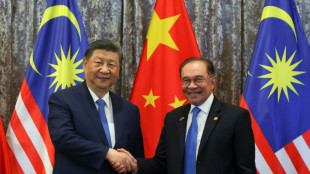 China's Xi meets Malaysian leaders, vows to 'safeguard' Asia allies
China's Xi meets Malaysian leaders, vows to 'safeguard' Asia allies
-
France urges release of jailed Russian journalists who covered Navalny

-
 Gabon striker Boupendza dies after 11th floor fall
Gabon striker Boupendza dies after 11th floor fall
-
UK top court rules definition of 'woman' based on sex at birth

-
 PSG keep Champions League bid alive, despite old ghosts reappearing
PSG keep Champions League bid alive, despite old ghosts reappearing
-
Stocks retreat as US hits Nvidia chip export to China


Phone bans sweep US schools despite skepticism
At a red-brick school in Virginia, Hayden Jones is one of 1,000 students banned from using their phones as part of a trial hoping to boost learning.
But the 12-year-old's verdict on the restrictions -- a shrug of his shoulders -- reflects the skepticism shared by some students and parents.
The phone ban at Twain Middle School is among a wave of measures implemented around the United States, and is part of a global movement replicated in Brazil, France and beyond.
Supporters believe restrictions will guard pupils from the apparent harms of smartphone use while at school, but opponents say the measures fail to prepare teenagers for the digital world they will inevitably enter.
Since September, Jones must now place his Android phone in a magnetic pouch each morning, which is locked until the end of the school day as part of a pilot scheme this academic year.
Jones, speaking to AFP in a corridor lined with classrooms, said he hopes the ban will be gone by the time he starts eighth grade in September.
"I like being able to go to my locker and call my parents. That's a big concern for me," he said, adding that some pupils have found ways to still use their devices -- including by bringing a "dummy phone" to put in the pouch.
School principal Matthew Mough admitted that enforcing the ban -- and winning over students -- has proved challenging, though he said most follow the rules.
"The majority of kids who have phones don't love it," he said. "However, if you dig deeper with them in the conversation, they will acknowledge that it's helped them remain focused."
Mough said the phone ban has reduced classroom distractions, cyberbullying and instances of students meeting up to skip lessons.
- 'Heads in the sand' -
Cell phone bans come alongside research suggesting that social media use increases the likelihood of mental illnesses like anxiety and depression in young people.
Advocacy groups regularly cite these studies as justification for school phone bans, which have seen rare political consensus in a nation deeply divided on virtually every other political issue.
Around 76 percent of US public schools -- from liberal California to conservative Florida -- had some sort of ban on non-academic phone use, according to the latest Department of Education figures, with several state-wide measures also in place or under consideration.
They are largely backed by teachers, with the National Education Association saying 90 percent of its members support policies banning phones during lessons.
"The biggest problem is that kids aren't in a place developmentally where they're able to handle the type of technology that we're talking about," said Sabine Polak, co-founder of the Phone-Free Schools Movement, which backs full-scale phone bans.
Critics of the restrictions argue that educating children about the potential risks of social media and smartphone use is better than prohibition.
"The answer is not to just ban and put our heads in the sand," said Keri Rodrigues, president of the National Parents Union, which represents over 1,000 parent organizations in the United States.
She compared efforts to ban phones to "abstinence education," noting that failing to properly teach children about complicated issues such as sex has failed in the past.
"It's not effective, and frankly, it's dumb," Rodrigues told AFP. "What we need to do is equip our kids with the information, with the skills and the strategies they're going to need to navigate a digital future."
At the school in Virginia, Jones said the phone ban has not changed how he interacts with his device, still using it for games, social media and watching YouTube videos.
His one complaint about his phone? "Nothing really, honestly, I mean besides the fact that it weighs a ton in my pocket."
T.Germann--VB



